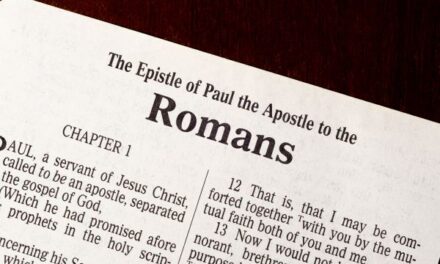No Longer Forsaken
By Dr. Jack R. Hodges, Jr.
Burke County
God’s gracious and merciful gift of a Messiah—One who would save His people from their sins—was the same One who was despised and forsaken by men. In spite of His unselfish, sacrificial death, by which He took upon Himself all of the sins of all humanity for all times—Jesus, God’s Messiah, was forsaken and rejected. The message of the cross was met with contempt and rejection! His message of unconditional love was scorned and laughed at! Not only was He rejected, but also, the unimaginable pain and suffering that the Savior endured were applauded and even called for. The crowds demanded blood—they demanded death! What they got was an innocent lamb who willingly laid down His life for the very ones who called for His demise and death. He died for the very ones who spat upon Him, cursed Him, breathed threats at Him, flailed and beat Him, and nailed Him to a cruel, inhumane cross.
Jesus’ short life here on earth allowed Almighty God to lean in and draw near to His beloved creation who were separated by their sins, alone in their helplessness and cut off from any hope. God leaned in because He saw the pain, the confusion, the misery, and the tears of humanity. He came near because He was the only one who could do anything about it! Only the designer and creator could reach down into the depths of a human soul and heart—and touch, heal, and remove the filthy stain of our sins. Only a loving God could forgive and cleanse the dark, black hearts within. Only faithful God could promise to never let us go—no matter what! Only God, our Savior, and Redeemer could offer us hope for tomorrow. And only He could keep those promises throughout all of eternity. So, He leaned in!
But when He came near, He was brushed off and pushed aside. Israel’s promised Messiah was supposed to be a great king like David who would raise a mighty army and deliver them from bondage to their enemies. The concept of “salvation” spoken of by the Psalms and the prophecies of Isaiah and Jeremiah, were interpreted as referring to a mighty military leader who would overthrow Rome. The Hebrew people tended to overlook or ignore the specific prophesies of Isaiah 53, which foretold that the Messiah would suffer and die. They had no use for another Rabbi or religious leader spouting love and acceptance. They needed a scrupulous, hard-driving, militant commander who wouldn’t stop for anything to get what he wanted—that is, to get what they wanted.
Today, as the Lord continues to lean into humanity, a nation and a world guided by secular humanism rise up in revolt, just like those of years gone by. Following human reason, secular ethics, and philosophical naturalism while specifically rejecting religious dogma, supernaturalism, and superstition as the basis of morality and decision making, they rely on “what seems right to me!” The reaction goes something like this: “We don’t need you, God, nor your truth to teach us about morality and decency. We can and will define it for ourselves. We will instead, call upon science and place our faith in a government led by human reason and situational ethics. We want leaders who will throw off the shackles of religion and faith and allow us to be what we want to be!”
When Isaiah described the suffering servant in Isaiah 53:3-12, we hear of the One who came to save, but instead was abandoned, deserted, discarded, betrayed, and rejected. “He was despised and forsaken of men, a man of sorrows and, acquainted with grief; And like one from whom men hide their face, He was despised and rejected and we did not esteem Him.”
C.H.Spurgeon, the great late 19th, and early 20th-century preacher, once asked: What does humanity want? He answered that question in a sermon he titled, “Why Christ Is Not Esteemed.” Spurgeon noted that that question “…must be the universal confession of the human race. From the highest monarch to the meanest peasant, from the loftiest intellect to the most degraded mind, from the admired of all men to the unknown and insignificant, this one confession must come: We esteemed Him not.” In his sermon, Spurgeon answered the question for his generation. But his answer is just as poignant for ours. He insisted that there are four reasons we do not esteem Jesus—because: (1) we esteemed ourselves so highly; (2) we esteemed the world so highly; (3) we did not know Him; and (4) we were spiritually dead.
Truly, our Savior and Lord will not and cannot be lifted up and glorified when a sinner sets up an idol-god (himself/herself) on the throne where God alone ought to sit. And truly, when the world and our flesh are more important than following after the will and the ways of Jesus, then He cannot and will not be worshipped and revered. And truly, when our Creator is not known for Who He really is, then He will not and cannot be loved and served. And truly, when one is spiritually dead in their trespasses and sins, one has no hope and no eternal security.
Spurgeon gave this illustration:
Suppose, he says, there is a man (or woman) whom I desire to influence (i.e., share the blessed gospel of Christ). I would “imagine that I am a skillful musician and that I touch the strings of my harp in such a manner as to bring forth the most delightful melody, yet the man takes no notice whatever of it. Then I turn to an instrument of quite another sort—a cornet or a bugle—and blow a blast that startles all of you—yet that one man still gives no heed to the sound! …I try to attract his attention in another way. I place before him the daintiest dish that the cleverest cook in all England can prepare, or I bring some rare delicacy from a distant land—but he regards the food no more than he did the music. I will try another plan to reach his senses. I will bring Him the choicest flowers that were ever grown. I will hold them close to his face and let their fragrance ascend to his nostrils. Yet he heeds not! What will awake him? Let Heaven’s thunder peals roll like the drums in the march of some mighty war-lord, but the man moves not. Let the lightning flash all around us till it seems as though the end of the world had come, but the man stirs not. What shall I do to awake him? Shall I beat him with a whip, or strike him with a sword? All is in vain and, at last, I perceive that the man is dead and that all my efforts have been wasted! Now the riddle is solved, the secret revealed, the knot untied—the man is dead.
Mankind’s most important pursuit is to know Jesus! It is not to know about Jesus—it is to know Him as Lord and Savior. It is to know His presence and goodness. It is to know and feel His love. For when we know God fully—we will love Him fully, and when we love Him fully, we will serve Him fully!
I want to remind you that, although Christ has been forsaken of men, He has not forsaken you and me. He came, He bled, He died! He gave His life a ransom for our sins. He rose victorious over sin and death and took His rightful place at the right hand of the Father. And now, we live and breathe to serve Him and make Him known. I urge you, as Paul urged the Roman Christians, “…by the mercies of God, that you present your bodies as a living and holy sacrifice, acceptable to God, which is your spiritual service of worship.”
_______________________________________________________________________________
Dr. Jack Hodges is the Senior Pastor at Pleasant Hill Baptist Church in Morganton, NC. He has served as a pastor, a biblical counselor, and an International Mission Board missionary. You can read more good Christian news from Dr. Jack Hodges HERE.
______________________________________________________________________________







